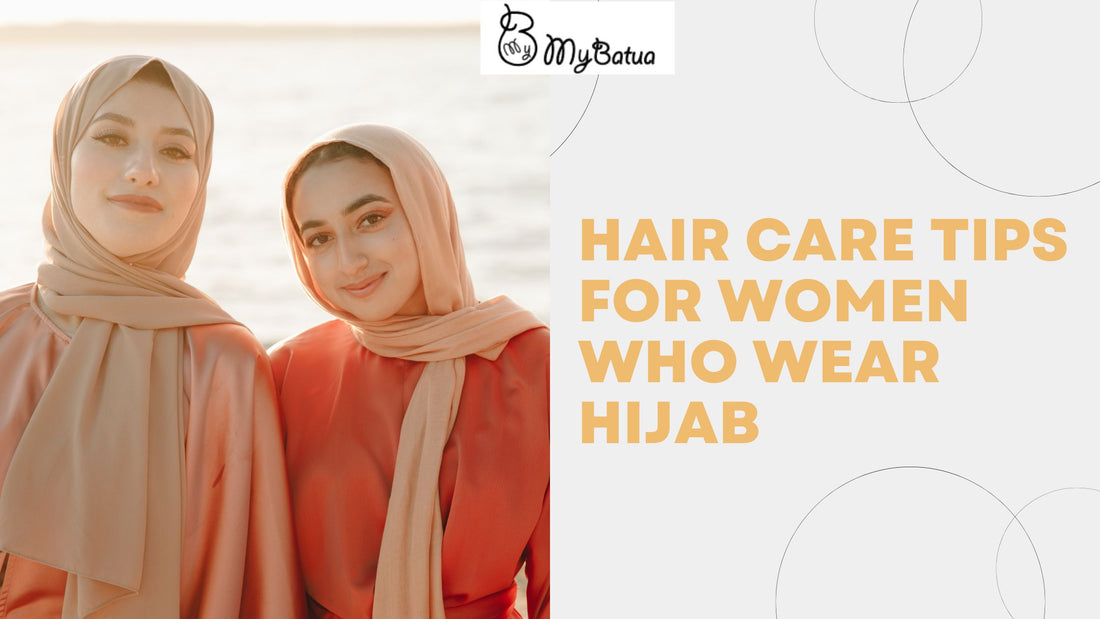
Hair Care Tips for Women Who Wear Hijab
Your hair deserves as much attention as the rest parts of your body. As a matter of fact, women pay a lot of attention to their hair. After all, it is the crown every human is blessed with. Should we not take care of our crown? It is common to find women who wear hijab being worried about their hair. Therefore, we have picked a few hair care tips that can extensively help you.
Are you often worried about hair loss, breakage, change in the texture of your hair, and other numerous problems we face? Well, you don’t have to be worried anymore. We are here to help you take care of your hair, read further below.

What is your Hair Type?
Are you aware of what type of hair you have got? If yes, then we are assuming that you must be already aware of the ways you can take care of such hair. Otherwise, you must find out. When you know your hair type, you will be able to know its specific needs too as in how many times you should wash it in a week, what kind of products you can use.
Women with curly hair might need to wash it more often as compared to women with straight hair. Usually, women who have wavy and curly hair are advised to wash them 3 times a week. The same goes with conditioner, straight hair might just need conditioning once a week but curly hair on the other hand requires conditioning 2-3 times a week to keep it tangle-free.

Follow Wash Routine
Most Muslim women are taught to wear Hijab since their childhood but as we grow and become more conscious about our hair, we need extra care. Wearing Hijab saves our hair from environmental pollutants but living in a humid climate can reverse this benefit. Your scalp might feel itchy due to the accumulated sweat. You may feel the need to wash it often however, the desire to wash it every day is not good. If you choose to do that, you might end up with dry and rough hair. Since washing your hair too frequently causes your hair to lose the natural oil your scalp produces to protect your hair.
Must Read : 10 HIJABI FASHION BLOGGERS YOU MUST FOLLOW IN 2024
We hope now you would have understood why maintaining a hair wash routine is important. Fix days when you want to shampoo your hair and stick to it. If you want silky, lucious curls waves, or straight tresses plan the days according to your hair type when you can dedicatedly give time wash, dry, and comb your hair. It is one of the secrets that many fashionistas follow to pamper their hair.

Lather & Massage your Scalp
While most of us don’t have much time today yet, we need to give the care we have to in order to ensure our so-called hair crown to be intact. Don’t rush to quickly leave the shower. Shampooing your hair can only give the best results if you do it well. When you apply shampoo, lather it gently to massage your scalp with fingertips. It circulates blood flow in your scalp promoting hair growth and helps in deep cleansing. When you rush, you just end up damaging your hair more rather than repairing the damage. Rather than shampooing 4 times a week do it 2-3 times but give the time it needs.

Dry your hair before wearing Hijab
We are always getting late for something or the else ending up finishing our daily routine as fast as possible. It hurts us in so many ways just like wearing Hijab over wet hair is damaging. While you might have very little time, but when you are washing your hair you should first let it dry before wrapping the hijab. Fastening Hijab on wet hair causes damage to the roots of your hair which almost won’t get the chance to dry up again during the whole day due to hijab. At the end of the day when you will take off your hijab, it is likely that you will find flattened hair. To top that, the bad odor to leave you worried.
Let Your Hair Breathe
After spending the whole day in Hijab, you might not get time to let your hair fall loose. Every thought that your hair might be getting suffocated because you have to follow this routine every day? While there’s nothing wrong with wearing a Hijab every day but, you must give that freedom to your hair when it gets to enjoy the wavy air or natural light.
Must Read : A Complete Guide to Abaya Fabric
You can give this freedom to your hair after you have shampooed your hair. It will naturally get dry while it will also get both air and light. Try checking your garden or your house plants with open hair or just sit to have breakfast before fastening your Hijab.
Please note that during weekends, when you can avoid wearing Hijab when you are not going out. Try soaking your hair with a suitable oil for some time to supply the nutrients it needs. Wrap a towel on top, open your favorite book or magazine and let them enjoy the freedom.
Use Silk as Your Pillow Cover or to Wrap Your Hair
It is significant for our hair to retain the natural moisture our scalp needs to protect the hair from its roots. When we use cotton, it almost observes all moisture be it as a pillow cover or even a cotton Hijab. Spending the whole night keeping your head on a cotton pillow possibly can leave you with a dry scalp. You might not even see this fabric to be an issue behind your dry hair but it is. Silk retains the moisture which is favorable for a nice, flowy, and tangle-free hair. Even satin Hijab and pillows aids in controlling hair sebum.
The best way to avoid this problem is to use a silk or satin cover for your pillow. Alternatively, you can lightly wrap your head in a silk scarf while going to bed in such a way that your hair doesn’t suffocate and you leave room for them to breathe. We recommend using a silk Hijab or the least you can do is use a silk underhijab / cap for the extra care your hair needs. The soft texture of these fabrics be it silk or satin avoid your hair ends to be pulled unnecessarily to cause damage.
The Right Kind of Hijab Fabric!
While it might be tempting to use all fashionable Hijab made with different types of fabric but it might leave you concerned to know that the type of fabric you might be using can damage your hair. As we discussed above that it is important to use soft fabric for our hair to avoid damages, try avoiding rough fabrics like net, etc. that can tangle or pull your hair. You might have noticed how an embellished hijab can sometimes be cruel to your hair. If you really want to use them, use a head cap or underhijab made with soft fabric like silk or satin and then use a net hijab on top. Fashion and protection will go hand in hand only if you are carefully picking the right fabric.
Must Read : MYBATUA OFFERS ABAYA DESIGNS THAT BLEND ISLAMIC FAITH AND FASHION!
We have covered many points to help you avoid damages to your hair especially when you wear Hijab but it is never enough since each one of us is born with a different type of hair. Needs and care differ accordingly. It is needless to say that we have to use hair products which are best suited for our hair. There are countless products like oil, shampoo, conditioners, hair color, etc., which claims to make our hair more beautiful and healthier. Don’t fall for that trap instead pick products that have less chemicals if want your hair to be smoother, silky, longer, wavy, and so on.
FAQs
1. Why is hair care important for women who wear Hijab?
Hair care is crucial for women who wear Hijab to prevent issues like hair loss, breakage, and changes in texture, ensuring their hair remains healthy and strong.
2. How can I determine my hair type?
Understanding your hair type involves observing its texture (curly, wavy, straight) and specific needs, such as how often it needs washing and conditioning.
3. How often should I wash my hair based on its type?
Women with curly hair should wash it 2-3 times a week, while those with straight hair may only need to wash it once a week. Conditioning frequency also varies accordingly.
4. What is a recommended hair wash routine for Hijabi women?
Maintain a fixed hair wash routine to avoid washing your hair too frequently, which can strip natural oils. Plan dedicated days for washing, drying, and combing based on your hair type.
5. How should I shampoo my hair for best results?
Lather shampoo gently and massage your scalp with fingertips to improve blood flow and promote hair growth. Avoid rushing the process to prevent hair damage.
6. Why is it important to dry hair before wearing a Hijab?
Wearing a Hijab over wet hair can damage hair roots and lead to flattened, bad-smelling hair. Always let your hair dry completely before covering it with a Hijab.
7. How can I let my hair breathe while wearing a Hijab daily?
Give your hair time to air and light after shampooing by keeping it loose for a while. Use weekends or downtime to let your hair enjoy freedom and rejuvenate.
8. What kind of pillow cover should I use for better hair care?
Use silk or satin pillow covers to retain your hair's natural moisture, preventing dryness that cotton fabrics might cause. You can also wrap your hair in a silk scarf at night.
9. What is the best Hijab fabric for hair care?
Soft fabrics like silk or satin are ideal for Hijabs to avoid hair damage. If using rough fabrics like net or embellished Hijabs, wear a soft undercap made of silk or satin.
10. How can I choose the right hair care products?
Select hair care products with fewer chemicals that suit your hair type and needs. Avoid falling for marketing traps and focus on products that genuinely enhance hair health.
11. What are the benefits of using silk or satin Hijabs and pillow covers?
Silk and satin help retain hair moisture, prevent dryness, and reduce hair breakage and tangling, ensuring healthier and more manageable hair.

1 comment
I really liked your blog! I think while staying within modest fashion, we should explore different styles and ideas. SiyahAks is a brand that’s truly working on modest fashion, offering stylish and elegant options for those who love to dress modestly.
Vist site: https://siyahaks.pk/